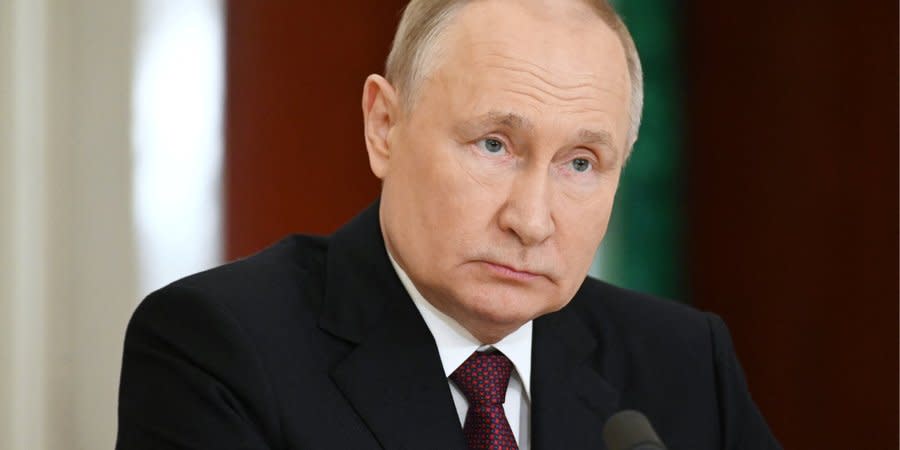Ukraine’s foreign intel head paints harrowing picture of Russia’s plans, list’s Top 4 priorities

The Kremlin has an aggressive plan for the future and is currently solving four tasks, Ukraine’s Foreign Intelligence Service head, Oleksandr Lytvynenko, said in his column for Interfax-Ukraine on Nov. 22.
Task No. 1 is to ensure internal stability, mobilize the population and economy, and increase the production of weapons and military equipment.
Read also: Russian fueling tension in Balkans says Ukraine’s military intelligence — exclusive
"The Kremlin has so far ensured economic stability and control over socio-political processes," Lytvynenko wrote.
“The political field has been cleared: the liberal and far-right (so-called "turbo-patriots") opposition has been destroyed or marginalized.”
By 2026, Russia's military production should support large-scale high-intensity hostilities, and in 2028, the aggressor should restore the military capabilities it had as of 2022, Lytvynenko says.
"This is what the Russian budget for 2024-2026 is designed for," he wrote.
Read also: Putin’s plan for the rest of the war
The Kremlin’s Task No. 2 is to form a coalition of states, a "majority coalition," alternative to the West. This "Global South+" format should promote models alternative to the West (political, economic, financial, humanitarian, value, etc.).
"The goal of the Russian Federation in building a majority coalition is to ‘normalize the West’, to turn it into just another region (Euro-Atlantic) with the prospect of further embedding Western countries in their regions (North America, Europe, East Asia), and the United States into just another leading world country," Lytvynenko added.
“In their view, the West is a powerful but retreating nature.”
To do this, the aggressor needs, among other things, to intensify nuclear blackmail, break the West's will to confront, and convince Western elites that they are "definitely losing" and should "peacefully retreat."
the key role in this will be played by strengthening the military power of Russia, China, and other countries of the majority coalition. At the same time, the outcome of the Russian war against Ukraine is of global importance and will be a powerful impetus for changing the global balance in one direction or another.
The Kremlin's No. 3 task is to prepare for future aggression against other countries, Lytvynenko said. The current priority is Moldova and the Baltic states: Lithuania, Latvia, Estonia – the entire western part of the former USSR.
"The Kremlin has already started such work," he wrote.
Read also: Zelenskyy says Russia wants to oust him from office by end of 2023 in ‘Maidan-3’ plot
“The reason is the (so-called – ed.) violation of the rights of Russian speakers (primarily in Latvia and Estonia). Moscow is already screaming about the oppression of Russian speakers in the Baltic States and the right of peoples to self-determination.”
After the expulsion of Russian diplomats-spies, Russians are actively infiltrating European countries, especially in the South, with their agents, creating businesses, NGOs, etc. There are signs of preparing an infrastructure of subversive activities for a major war.
Task No. 4 facing the Kremlin is to stir up conflicts in the Middle East, Africa, and the Balkans, Lytvynenko believes.
The aggressor's approach to the Middle East conflict is known, but we should not forget about Africa.
The public execution of Wagner PMC leader Yevgeny Prigozhin does not mean that the Kremlin "has abandoned the Prigozhin modus operandi on the continent," he wrote.
Russia is forming an "expeditionary corps" involving not only the remnants of Wagner, but also the Russian General Staff, Russian Foreign Intelligence Service, and Russian Federal Security Service, said Lytvynenko.
Read also: Russian aviation ‘on verge of collapse’ due to sanctions, Ukraine announces after successful hack
The Russians are seeking to take advantage of the weakening of the West's positions, especially France's, in the Sahel region of Africa and on the continent in general.
"We are talking about natural resources, attempts to limit Europeans' access to uranium, oil and gas, and to get rid of sources of supply alternative to Russia," he said.
We’re bringing the voice of Ukraine to the world. Support us with a one-time donation, or become a Patron!
Read the original article on The New Voice of Ukraine

